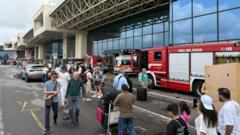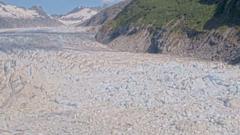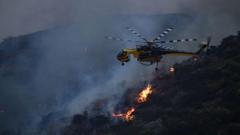Smoke from numerous wildfires in Western Canada has begun to affect air quality significantly, raising alarms across Eastern Canada and parts of the upper Midwest in the United States. Manitoba is in the midst of its most intense wildfire season in three decades, prompting Environment Canada to issue an air quality alert, particularly impacting Toronto, the country’s largest city. Over the weekend, the situation deteriorated, resulting in hazy skies and rankings that placed Toronto among the world’s cities with the worst air quality, according to IQAir, an air monitoring firm.
The hazardous conditions have led officials to recommend that residents limit strenuous outdoor activities not only in Toronto but also in surrounding areas, such as Saskatchewan's Saskatoon. Meanwhile, several regions in the U.S., including northern Minnesota and parts of western New York, have also reported deteriorating air quality caused by the smoke.
Meteorologist Ian Hubbard from Environment Canada noted that while wildfire smoke generally doesn’t pose a significant risk when suspended high in the atmosphere, problems arise when it descends to ground level, severely impacting air quality. Although improvement in Toronto’s air quality is anticipated, the city is expected to face persistently high temperatures for much of the week, exceeding 30 degrees Celsius, or approximately 86 degrees Fahrenheit.
Manitoba's wildfire crisis is particularly alarming, with Premier Wab Kinew declaring a state of emergency for the second time recently. The fires have already caused casualties, including two fatalities reported following severe conditions, and forced the evacuation of over 30,000 residents. Emergency measures are being implemented to help those displaced, with some individuals airlifted from remote locations under perilous circumstances.
The wildfires have not only become a pressing environmental issue but a political one as well, igniting tensions between the U.S. and Canada. In response to the smoke blanketing several northern states, six Republican lawmakers accused the Canadian government of mismanaging its forest resources. Congressman Tom Tiffany of Wisconsin publicly criticized the Canadian authorities on social media, alleging that they were “failures” in managing their forests, which contributed to the smoke issues affecting the U.S.
As this crisis unfolds, it serves as a reminder of the challenges posed by climate change and its consequential effects on air quality and public health across international borders.




















